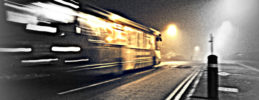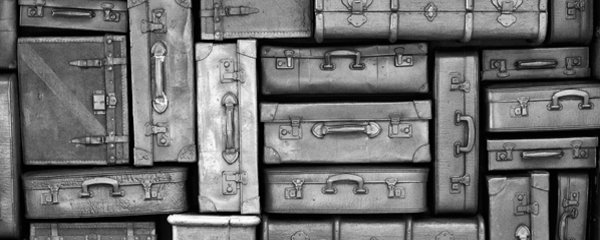
(‘Luggage’ © Black Powder, 2013)
KAY GILMORE, Thresholds’ Social & Editorial Intern, visits Citizen: The New Story Festival, a programme of salon readings, events, discussions and classes exploring nationality, identity and belonging, themes that are among the most powerful and divisive concepts of our times.
“To be a citizen of everywhere, is to be a citizen of nowhere.” Cathy Galvin opened the three day festival by paraphrasing Theresa May. Writers from many different backgrounds and places came together at the University of Liverpool in London to debate what it means to be a citizen.
In the We are Multitudes session, Maureen Freely asked the panellists how they answer the question where do come from?
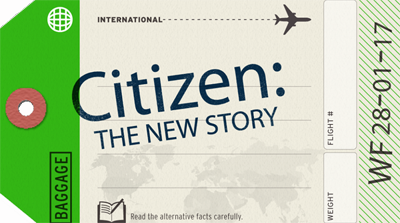 Poet and Novelist Anthony Joseph tells people he’s Trinidadian though he left the island in his twenties. When he goes back he knows he’s “a tourist, for the first week at least.”
Poet and Novelist Anthony Joseph tells people he’s Trinidadian though he left the island in his twenties. When he goes back he knows he’s “a tourist, for the first week at least.”
Preti Taneja, founder of Visual Verse, is of Indian descendent. Growing up she liked to confuse people by saying she was from Stevenage. Some people would persist, but where are your parents from?
Melissa Fu’s parents made her take Chinese classes on Saturdays growing up in New Mexico. Only her elder brother stuck with it. Now writes her letters in Chinese that she cannot understand. So she answers the question by saying she’s from New Mexico, though she now lives in Cambridge and has recently become a UK Citizen.
Maureen left us by proposing an alternative nationality: What if we belonged to the nation of books instead?
In We Need to Talk About Brexit, Lionel Shriver read a specially commissioned short story which is a coda to her novel, The Mandibles. Set in 2047 following a nuclear exchange between North Korea and America, the character Alex Carver is writing to a former partner holed up in Scotland. Alex hopes the letter gets there as the Royal Mail is now reduced to bicycles. At least England has a mail service as the rest of Europe suffers under a sort of ‘Middle Ages redux.’
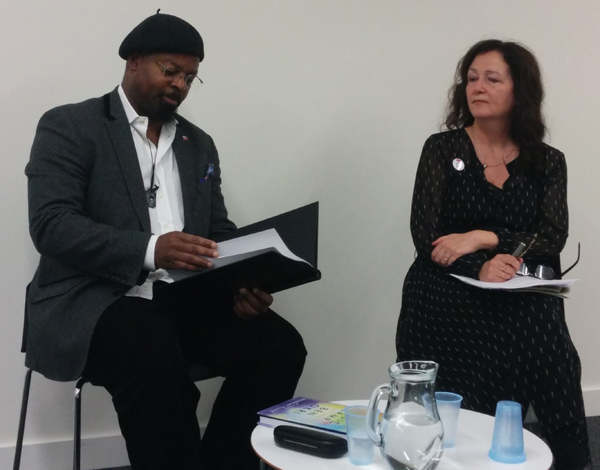
Alex is working in a migrant camp trying to cope with food shortages, no doctors and raw sewage. Militias patrol the south coast boasting about migrants they have ‘helped go under’ as they try to cross the Channel. There are moments of hope. A mother in the camp shares her last protein biscuit with another mother and child. The narrator recalls missing what was previously known as England; old pub signs and M&S madeira cake with a “splash of custard”.
For Ben Okri, citizenship is a vexed question. Throughout history the first thing a colonial invader does, is to offer back citizenship of the new country to the conquered. In the present we have become nostalgic for a past that never was, forgetting if you go back far enough, we are all immigrants with each wave adding “something unexpectedly wonderful”.
Now we face a crisis, all the more dangerous because it is invisible. For him Brexit didn’t just happen overnight, nor Grenfell, which is his view was doomed “even before the first brick was laid”. He recalled the story his mother used to tell him of the frog in the frying pan that doesn’t realise it is slowly cooking. We are like that frog in the pan and fears that we are sleepwalking towards disaster, like Europe before the start of World War I.
In his latest book The Magic Lamp, he asks what is the story lying dormant in our culture that will make us wake up?
~
Citizen: The New Story Festival is organised by The Word Factory.
~
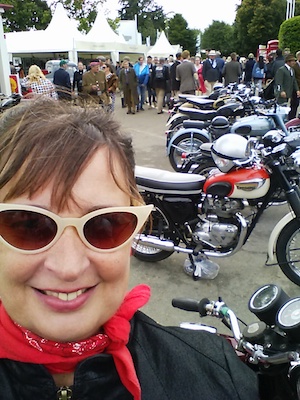 Kay Gilmore is Thresholds’ Social & Editorial Intern. She is a student on the MA in Creative Writing at Chichester. Her first degree was in Eng. Lit. but that was a long time ago, before she accidentally ended up in marketing in the tech sector. Her main interests are novels and short fiction and she is a fan of David Mitchell and Hilary Mantel.
Kay Gilmore is Thresholds’ Social & Editorial Intern. She is a student on the MA in Creative Writing at Chichester. Her first degree was in Eng. Lit. but that was a long time ago, before she accidentally ended up in marketing in the tech sector. Her main interests are novels and short fiction and she is a fan of David Mitchell and Hilary Mantel.
